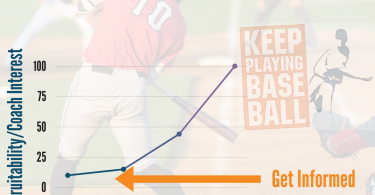In baseball, it often comes down to the last at bat. Players who haven’t had much success early in the game are often given a chance to turn the tide and be the hero. If it is late in the game and you haven’t had success getting interest from a school you want to play for, don’t give up. Your biggest at bat may still lie ahead.
Some of college baseball’s best players signed at the last minute, and some even committed to their school only a week or two before classes started. We are not guaranteeing that a late miracle will happen for you, but continuing to do the right things can increase your chances of a “game-winning” opportunity. A lot of things change late, especially at D1 schools, where a surprise draft pick can open up a roster spot at a moment’s notice.
So what do you do if it is late in your senior year and you don’t have a place to play? You need to do two things: 1) stay proactive in trying to find a team and 2) develop a quality backup plan. While you maintain contact with coaches from schools of interest, start to develop alternative plans like attending a junior college. Keep playing and improving. Coaches are often out on the road recruiting late in the year, so keep working hard and stay focused on improving your game. Here are a few more quick tips to help increase your chances of being noticed, but remember to set up a back-up plan:
Stay Proactive
- Maintain contact with coaches of schools of interest. Let them know that you are still available and interested in their program. Don’t be shy and don’t wait for someone else to tell them for you. If it doesn’t work out, you know you tried everything you could to get there, and you will have no regrets. Senior year is the time to be aggressive in seeking exposure and contacting coaches.
- Ask these coaches for a realistic assessment of where you stand in their recruiting plans and your chances of earning a roster spot or tryout. Even if they tell you things you don’t want to hear, listen to their ideas about where you need to improve and start working on any limitations you may have.
- Ask your high school coach to call some of his college-level contacts who might need a player like you.
- Make sure that you are well prepared for any opportunity to be seen by coaches and do your best at every practice, during any game, and at any camp or showcase. You never know who might be watching.
- Make sure that you appear to be a skilled, confident, team-oriented player anytime and anywhere a coach may see you or anything about you, including online.
- Make sure that you are not being passed over because of a serious mistake you have made at school or on the field or because of a bad reputation. While you can’t go back in time and change what happened, you can take responsibility for mistakes and tell prospective coaches that you have grown as a person and regret what happened.
- Remember that you are the one that the coaches need to notice so make sure that you are the one doing the work to get noticed. Relying on your parents to do the talking for you may make some coaches think you are not ready for college baseball.
Make a Back-up Plan
- After getting a realistic evaluation by college coaches or someone you trust, you may need to reconsider where you are willing to play. Consider broadening your contact list to include coaches at schools you didn’t have on your original list, including schools in other divisions.
- Take a look at the baseball programs at the junior colleges in your area. Get in touch with the coaches in these programs and ask them how you might fit on their teams. Playing in junior college may give you the playing time you need to grow and improve as a player.
- Consider whether or not you are interested in trying to “walk-on” to a team. This decision is a complicated one, but getting to know more about how this process works might be useful as you develop your back-up plan. Read more about walking on here.







